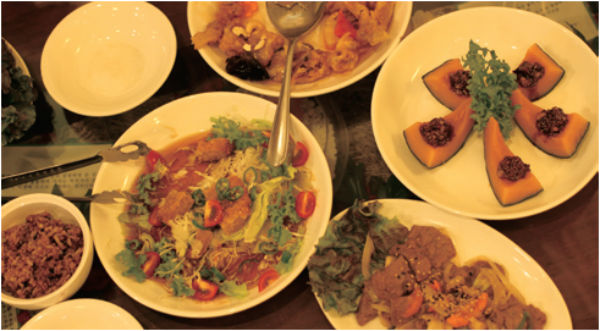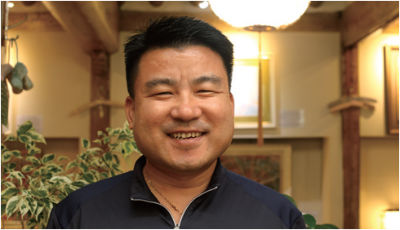“Why don’t you eat meat?” The World Vegetarian Day that brings awareness on vegetarianism to the world is on October 1, every year. Several years ago, vegetarianism started to appear on the media as a new trend, but it still remains as a minor culture. As keywords such as “animal welfare” or “well-being” are becoming more important, vegetarianism is appearing as a self-expression for individuals and a unique lifestyle. The Sungkyun Times (SKT) investigates the lifestyle of vegetarianism by looking at the trend and presenting special interviews with vegetarians and hopes that Kingos will have a chance to think about this trend.
What is Vegetarianism?
Vegetarianism = Only Eating Green Food?
Vegetarians are people who avoid eating meat and eat vegetables. More specifically, it is a terminology that refers to people who abstain from the consumption of meat, seafood, the flesh of any animal, and animal products resulting from slaughter.
In general, vegetarians are considered as a group of people who only consume “green foods” and vegetables. Although vegetarians struggle to avoid eating meat, not all vegetarians have the same diets. There are different types of vegetarianism. Some vegetarians eat dairy products such as eggs or milk, but others never eat any products related to animals. Levels exist within vegetarianism regarding their food consumption.
History of Vegetarianism
Vegetarianism first appeared in ancient India and Greece, both led by religious groups or philosophers. Ancient people insisted on vegetarianism as a fulfillment of doing no harm on lives. In India, it is understood with the terminology “ahimsa,” which means nonviolence in Hinduism.
In 1847, in the United Kingdom, an association of vegetarians was established for the first time, and in 1908, the International Vegetarian Union was organized. Currently, vegetarianism has spread throughout the whole world and the number of vegetarians seems to increase due to the expectations of the functions of vegetarianism, such as health and environmental benefits.
Influence of Vegetarianism
Vegetarians have individual reasons for becoming vegetarians and practicing vegetarianism. Although there are various reasons, they can be organized with three keywords. The reasons in becoming a vegetarian not only influence the individuals, but also give social impacts which are related to the Earth and our society.
Health
Many medical discoveries have proven the dangerous influence of meat consumption on health. Representatively, cardiovascular diseases are highly related to eating meat, and the American Medical Journal has proven that vegetarianism can reduce the risk of cardiovascular diseases in an individual by 97%. Many of the reports also claim that vegetarianism has good health effects on people by decreasing the possibility of cancer while increasing life expectancy.
Animal Protection
Many animal lovers often become vegetarians. The vegetarians who are interested in animal welfare believe that animals have the same emotions as human beings. As a result, they insist on the protection of animals that are raised and killed through unethical and cruel methods. Joby Warrick, a writer of The Washington Post, presented a striking aritcle by the title, “They (cattle) Die Piece by Piece.” The cattle are cruelly butchered into pieces even before their death.
Environment Protection
According to a report from the United Nations, methane emission from livestock takes up more than 18.2% of all methane emissions that cause global warming. This index is higher than that of the transportation sector, at 13.5%. This result shows that vegetarianism is also needed as one of the methods to keep our Earth safe.
Facilities for Vegetarians
Foreign Countries
It is true that many foreign countries have adopted the concept of vegetarianism as an individual’s belief and lifestyle. India, which has more than 70% of the world’s vegetarians, has many services for them. India distinguishes the restaurants that are for vegetarians and non-vegetarians for the convenience of both groups. Processed foods also have labels on the package showing whether the product is for vegetarians. In addition, Western countries like Netherlands and the United States (US) have restaurants for vegetarians and there are many non-vegetarian restaurants serving special dishes for vegetarians.
Korea
The number of vegetarians in Korea is also increasing. Korean vegetarians are growing and many foreign vegetarians are also coming to Korea. Specifically, the SKT found many exchange students in SKKU who are vegetarians. By interviewing one of the students, the SKT investigates and compares the different environments for vegetarians in Korea and her country, the Netherlands. Additionally, we interviewed the CEO of a vegetarian company and a vegetarian restaurant located in Insa-dong, called Osegyehyang.
Interview in a Vegetarian Restaurant
First Interviewee: Menthe
SKT: Hello Menthe! Can you introduce yourself and tell us how you became a vegetarian?

M (Menthe): Hi, I am an exchange student in SKKU from the Netherlands. I became a vegetarian at the age of 12. One day, my friend told me about a documentary film that reported how animals are cruelly slaughtered by humans. When I first heard this, I was shocked, and one day in my home, I saw a similar documentary. At that moment, I made up my mind to become a vegetarian.
SKT: Thank you for sharing your story. After coming to Korea, how is living as a vegetarian?
M: To be frank, before coming to Korea, I knew that Korea was not yet a country that has many facilities for vegetarians. You know, Koreans love ”fried chicken!” In Korea, it is difficult for vegetarians to eat food. For example, I usually drink bio-milk in our country instead of normal milk. Bio-milk is produced through clean procedures, giving less stress to dairy cattle. However, in Korea, it is really expensive to buy vegetables, and even harder to find vegetarian products like bio-milk.
SKT: Are there many vegetarians in the Netherlands?
M: I think the whole percentage will be less than 30%, but I think it is increasing among youth. Many of my university friends are vegetarians! Actually the number does not matter a lot. We just respect our different tastes and try to understand each other. My parents are not vegetarians, but they respect my personal belief and let me preserve it. Also the nation has developed and changed with consideration for vegetarians. Many ordinary restaurants have menus for us and we can easily find non-animal products.


Second Interviewee: Seung Sup, Lee
SKT: Can you introduce yourself and your vegetarian life?

Lee: Hello, I am the CEO of Vegefood which is a company that produces healthy vegetable food. Also, I own a vegetarian restaurant, Osegyehyang, in Insa-dong. I became a vegetarian 20 years ago when I was a university student. One day, I saw live clams which were the ones that I kept in the black plastic bag as dinner ingredients for another dinner. It was at night so the house was really quiet, but the clams were making sounds by clashing into each other. I felt so sorry for them and the thought just got into my mind that it is not right to eat them. I just recognized that all animals are like humans, with emotions and life. After this realization, I stopped eating meats or other living things.
SKT: How was it to become a vegetarian in such a sudden way? Also, how was it to live as a vegetarian in Korea in the past?
Lee: It was really hard. Before my decision to become a vegetarian, I was a university student who liked to eat seafood and meat. As I just started not to eat living things, I just ate vegetables, and sometimes I really wanted to eat ramen. Also, 20 years ago, there was no such concept as ”vegetarian” in Korea. I could not find any vegetarian restaurants or products.
SKT: What made you to become a CEO of a vegetarian product company?
Lee: After my university graduation, I went to Taiwan for traveling. By chance, I tasted a slice of ham made of beans. This was my first experience of knowing and eating substitute food for vegetarians. I didn’t know that we could make food that tasted and looked like meat with healthy and natural ingredients like beans and lotus roots. After this, I left my previous company and went to Taiwan again to research those substitute foods for vegetarians. A few years later, I opened my own restaurant and company.
SKT: Do you have any last words for university students?
Lee: It is still true that Korea has less vegetarians than other countries, however, I feel that Korea is changing a lot. Many people became vegetarian, and even non-vegetarians are thinking about the environmental issues and their personal health, which brings attention to vegetarianism. I think the increasing attention is a very good sign and will lead us to a brighter future for vegetarian society in Korea. I hope that university students come to know about this vegetarian culture and have a chance to think about issues like animal welfare or the ethical issues of eating meat. Considering another lifestyle can change your whole life, just like it changed mine.
“Is being a vegetarian something special in Korea?” asked one of the foreign vegetarians that the SKT met while preparing this article. The answer was “yes” and this question struck us as both interesting and important. This shows that other countries do not regard vegetarians as new or special people, but just as another group of people who have different preferences in eating food. As we have the freedom to eat what we want, we also have the freedom not to eat certain foods. This can be the first step of understanding vegetarians. Instead of continuously asking why they do not eat meat, it is necessary to listen to their stories on why they became vegetarians and to try to understand their stance
